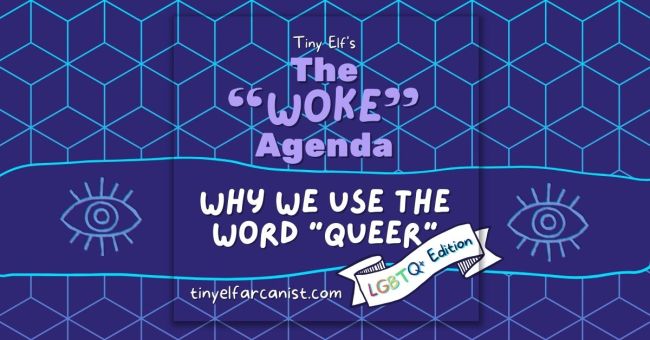
CW: homophobia.
Pride Month is here and with it comes the wave of discourse attached to the LGBTQ+ community: ‘Why is there no “Straight Pride”?’, ‘Kids don’t need to know about who you sleep with!’, ‘I don’t want the bisexual woman to bring her cishet boyfriend to Pride’, ‘I’m “gay”, not “queer”.’
I’m not here to tackle the problems with each of those statements. I’ll just address why the term queer has gained popularity over others (I’m still partial to “Alphabet Mafia”) and why some people still oppose it.
I’ve talked about how labels can give a sense of community, but they can also feel limiting if you can’t find the perfect label for your specific experience.
What does “queer” mean?
Like most words, the word queer has various different meanings. Quick history lesson! From its 16th century origin as “eccentric”, “weird”, or even “unwell”, meanings which are still in use, it has evolved (as language does) to contain a whole community of people whose experiences go out of the allosexual monogamous cisheteronorm. By the late 19th century and early 20th century, it became a pejorative term used against feminine men.
Once also a derogatory term, starting from the 50s to being popularized in the 70s, the word gay became an umbrella term to anyone not heterosexual or cisgender but it’s now more frequently used to refer to men attracted to other men.
Fast-forward to the early 90s, activist groups among the LGBTQIA+ community start using the word queer to refer to themselves and reclaiming it in their campaigns. In the late 90s, gay was the primary homophobic insult among young people; even early in the 21st century, there was the need for campaigns to stop using the word gay as a pejorative.
Let’s get to the current meaning of the word “queer”. The UK-based charity Stonewall defines queer as follows:
Queer is a term used by those wanting to reject specific labels of romantic orientation, sexual orientation and/or gender identity. It can also be a way of rejecting the perceived norms of the LGBT community (racism, sizeism, ableism etc).
The term is still controversial. Some of its opponents take a more assimilationist approach to the LGBTQIA+ community, while others have endured its use as a slur and are not comfortable with it. But scholar Robin Brontsema puts it splendidly by saying “It necessarily depends upon the word’s pejoration for its revolutionary resignification”. Its power resides in its reclamation.
The Freedom of “queerness”
Sexuality can be fluid and gender is a spectrum. Someone’s gender identity and sexual orientation are particular to that individual; the number of labels can become infinitesimal and still impossible for someone to find one that comprises their full experience. Therefore, using queer can reduce the pressure of defining oneself and equating it to ‘I’m not straight’. It’s as much definition as non-definition.
For me, queerness encompasses my sexual identity as someone uncomfortable with binary presentation. It also encompasses my rebuke of cisgender and heteronormative privilege and the intersection of these privileges with white privilege. LGBT+ labels tend to presume a binary origination, and their usage coincides with a social movement that seeks assimilation and erases the existence of non-binary identities. Using “queer” as a catch-all umbrella term, whether intentionally or not, silences that important fringe voice.
Abrams, Vonte 2023
Despite what some people claim, the acceptance of queer people isn’t widespread. Our existence is still illegal in some countries, and even when it isn’t, our lives are in danger in the hands of intolerant people. Those who don’t “fit” in other ways (disabled people, neurodivergent people, BIPOC, gender non-conforming) are at increased risk.
Not everyone has a safe space to be themself, and they can feel alienated when their peers tell them there is a way they should look, a way they should be, and a way they should refer to themselves. We don’t need to gatekeep a community that is already ostracized.
I respect and support everyone’s decision to use the labels they feel most comfortable with and to reject the ones they don’t find fitting. I understand not everyone wants to use the term queer for themselves.
While the terms we use to define the queer community will keep evolving, for now:
“We‘re here. We‘re queer. Get used to it.”
Stay tuned for more “woke” content from this Social Justice Arcanist.
If you wish to contribute to the series, contact me via email at tinyelfarcanist@gmail.com.
References
- Wikipedia contributors. (2024, May 31). Queer. In Wikipedia, The Free Encyclopedia.
- Cheves, Alexander. (2023, June 14). 9 LGBTQ+ People Explain How They Love, Hate, and Understand the Word “Queer”. them.
- Brontsema, R. (2004). A Queer Revolution: Reconceptualizing the Debate Over Linguistic Reclamation. Colorado Research in Linguistics, 17.
- Blakemore, Erin. (2021, October 19). From LGBT to LGBTQIA+: The evolving recognition of identity. National Geographic.
- Saint Thomas, S. & Varina, R. (2024, May 14). Unpacking the Term “Queer,” Its History, and What It Really Means. Cosmopolitan.

Leave a comment